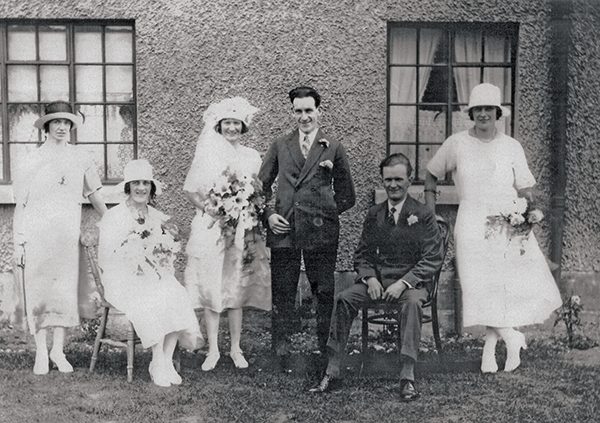
Pictured: Charlie and Mollie Kenny on the day of their wedding outside the family home at 131 Ringsend Park.
A Ringsend teenager unexpectedly found himself in the right place at the right time to become part of the narrative of the 1916 Rising.
When thirteen-year-old Charles Kenny, who lived with his family at 131 Ringsend Park, passed the exams for the job of Post Office messenger, he left school to take up a post as a telegraph boy.
He was based in the GPO with 50 or 60 other messengers. At the time, they were paid three farthings for every telegram delivered, leading the children of Dublin to chant: “GPO three farthings a go,” when they saw them pass by.
Charlie and a couple of the lads he worked with were “very keen on money” and used to race around the city delivering their telegrams. They were earning about £1 per week, which was big money at the time, so much so that the Post Office reduced the delivery rate because someone somewhere decided that they were earning too much.
One day, Charlie was in the delivery office in the GPO when a man carrying two revolvers came in and demanded the keys from Inspector Garrett, who was in charge at the time. The man ordered the messenger boys to hand over the telegrams, he read them, handed them back and told everyone to get out.
Later, when Charlie was hanging around outside the building, no doubt curious about what was going on, he saw platters of meat and food being carried into the Post Office from the hotel next door, where Penneys now stands. As he watched, someone he knew asked him if he would deliver a message. He agreed to do this and was led to a room at the top of the building where a man wrote a note and asked him to take it to Boland’s Mills. He was to deliver it personally to Eamon De Valera. Charlie delivered the note and then went home – unaware that he had played a small part in the Rebellion. He later discovered that the man who had given him the note was James Connolly.
After the Rising, the General Post Office moved to Amiens Street. Charlie didn’t return to work for about a week. When he did, his boss, Inspector McCormack, asked him if he was ashamed of the (Royal Mail) uniform. He said he was and was promptly suspended for a week. After that things were “hot for him at work” because of his sympathy for “the cause.” He resigned his position on October 6th, 1916.
The following year, Charlie went to work in the Pigeon House, under Mr. Kettle, the City Electrical Engineer, at a wage of 19 shillings per week. He worked there until he retired in December 1964. He started his 47 years’ service as a tradesman’s helper and finished as a leading conveyor man.
In 1936 he married Mary (Mollie) Lonergan from Mary Street. They celebrated their wedding in a marquee in the garden of the family home at 131 Ringsend Park.
Mollie and Charlie later moved to 136 Ringsend Park, where their daughter Phyllis still lives today. Charlie was well-known in the Ringsend and Irishtown area as a passionate supporter of Shamrock Rovers Football Club, where he was a shareholder.
By Jennifer Reddin



